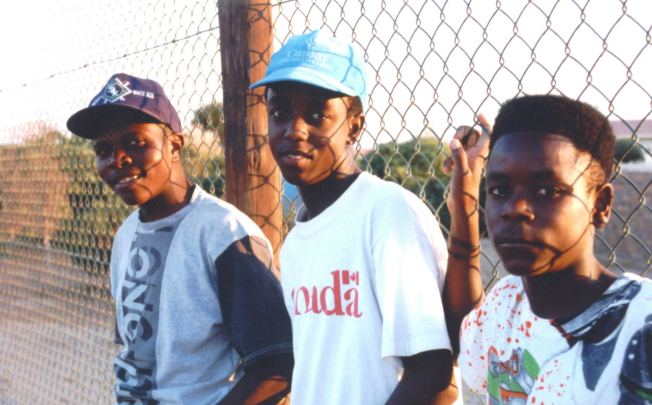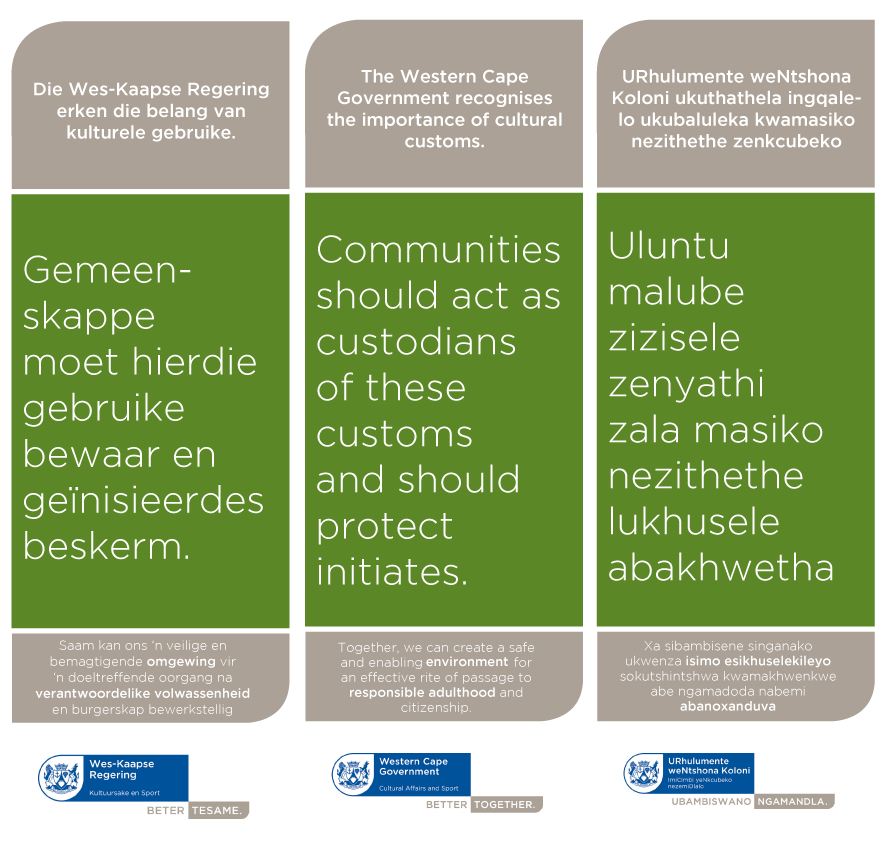Keeping young men safe and healthy during customary initiation
As a cultural rite of passage, male initiation marks the transition from boyhood (ubukhwenkwe in isiXhosa) to manhood (ubudoda in isiXhosa) and is practised by the Xhosa, Hlubi and Sotho tribes in the Western Cape. The winter initiation season in the Western Cape is from May to July each year, and in the summer season from November to January. Only Xhosa initiates practise initiation during winter.

Initiation is one of the few cultural practices that has endured and survived social, economic and political changes over the centuries. It’s an important social custom that enables the shift from childhood to more complex adult behaviour.
This is testament to the value that's attached to this aspect of culture by
the communities who practise it. But yet, as old as these practices may
be, unsafe and unsanitary conditions have led to many young men losing their lives.
The Western Cape Department of Cultural Affairs and Sport (DCAS) has again dedicated itself to meeting with communities to discuss this mutual concern and assist in providing infrastructure at initiation sites throughout the province. The management of initiation has 3 phases, which are the pre-initiation, during-initiation and post-initiation.
Health implications
Every year there are hospital admissions and deaths mainly caused by dehydration. Many of the admitted initiates experienced delayed wound healing, swelling, mild wound infection, lacerations and botched circumcision. The Western Cape Department of Health takes these incidents very seriously and have developed protocols and responses to various issues including:
- key disease outbreak response and provincial infection control, for the management of diseases and infections at initiation sites,
- admission to healthcare facilities in case of complications (including referral pathways),
- early detection of health complications in initiates,
- training of traditional surgeons, carers and monitors,
- controlled access to basic care material for trained practitioners at provincial outlets and/or clinics,
- outreach to traditional circumcision schools and support to the circumcision programme, and
- maintaining a database and statistics on initiation sites, through departmental infrastructure.
The provision of training
DCAS has made provision for training aimed at developing a common understanding on issues pertaining to initiation. Training provided to carers, practitioners and traditional surgeons focus on the core areas of:
- health,
- hygiene,
- fire-management, and
- sustainable use of environmental resources.
During the previous initiation season, the department trained practitioners, 103 in First Aid and 143 in Fire Awareness. The aim is to train many more during the current financial year.
Community participation and involvement through initiation forums
Western Cape Minister of Cultural Affairs and Sport, Anroux Marais, encourages community participation and involvement in ensuring a safe and enabling environment for the rite of passage to be observed responsibly. All prospective initiates must be medically screened at least 2 months before the time to ensure physical fitness for initiation.
The Department is providing consent forms that must be completed and signed by prospective initiates, parents or guardians, responsible traditional carers and surgeons.
If any community member has any concerns relating to the cultural practice or would like to consult with an appropriate role-player, they can contact the relevant initiation forum chairpersons.
Our initiation programme is further guided by the Initiation Framework and Protocol, which encourages:
- Community participation in issues pertaining to initiation.
- Greater community awareness.
- Increased awareness of health concerns.
- Community co-operation with health institutions.
- The establishment of practitioner structures.
- Standardisation of the practice.
- Skilled traditional practitioners and carers.
- Bringing the practice in line with the modern needs of communities.
- Seasonal job creation opportunities in line with the Extended Public Works Programme (EPWP).
- Secure and serviced initiation sites.
- Mainstreaming of the practice.
Our goal is to create a safe and enabling environment for the effective rite of passage to responsible adulthood and citizenship.
For more information:
Please read the Initiation Framework and Protocol.
Listen to Initiation Season Radio Ads
Afrikaans:
English:
isiXhosa:



